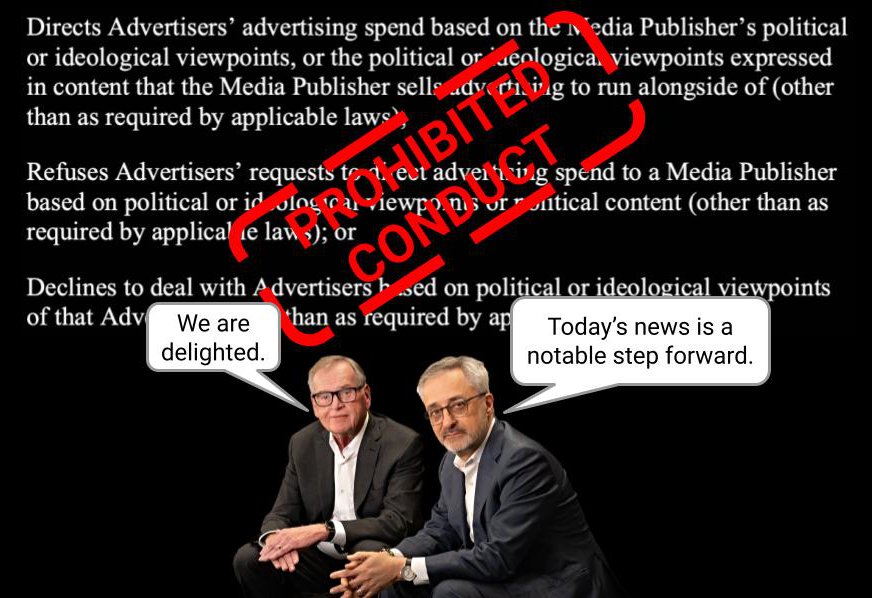
As far as
industry metonymies go, Omnicom's and Interpublic's decision to accept the Trump Administration's consent decree this week is Madison Avenue's equivalent of the Big Law moment, when some of the nation's top law firms caved in and capitulated on
Trump's onerous terms, rather than fight them on legal grounds.
"We are delighted," Omnicom's John Wren said in a statement informing the holding companies' shareholders. It's a "notable step
forward," added Interpublic's Philippe Krakowsky.
More like two steps back, if you ask me, because two of the world's biggest ad companies just set a dangerous industry precedent by agreeing
to let politics determine how and where they place their clients' media buys.
advertisement
advertisement
Sure, the consent decree is worded the opposite way -- that Omnicom and Interpublic are now prohibited from
excluding media outlets based on their political or ideological views -- but the practical effect is they are now required to turn a blind eye to media outlets that have also been conducting a war on
truth, justice and the American way, including the spread of misinformation.
I find it especially ironic that Interpublic, whose roots include the McCann-Erickson motto "The Truth Well Told,"
has caved in, because it had been a leader in propagating truth and fighting misinformation, including its development of news equity marketplaces, as well as diversity marketplaces, to encourage ad
dollars supporting the best media actors, not the worst ones.
And while Omnicom has been more muted on those issues, I know it has always prided itself on its approach to media neutrality, and
planning and buying the media that are both safe for and advance the communications objectives of its clients' brands.
The capitulation isn't just bad for Omnicom's and Interpublic's clients
and organization, but builds on the anti-commercial free speech momentum that started to build with Elon Musk's suit that shuttered the Global Alliance for Responsible Media (GARM) and continues to
threaten both the World Federation of Advertisers, as well as some of its biggest members.
It also follows Jim Jordan's House Judiciary Committee investigation of Omnicom and Interpublic on political
grounds, as well as a threat to probe Dentsu's attempt to jumpstart its own post-GARM industry initiative supporting
responsible media. Dentsu subsequently abandoned that initiative.
Politics aside, Omnicom's and Interpublic's capitulation creates another dangerous precedent for brand safety by making both "exclusion," as well as "inclusion" lists prohibited -- at least inside
what will be the biggest buyer of ad-supported media in the world.
Ironically, the ad industry's shift away from exclusion (ie. blacklists) and toward inclusion was moving things in the right,
arguably politically-neutral direction, because it supported good media actors without explicitly harming its bad actors.
Omnicom's and Interpublic's leadership may be delighted by their
capitulation, but it's probably more about their own golden parachutes and the immediate returns on shareholder value, and not -- as people are fond of thinking about on Madison Avenue -- their
long-term brand equity.
In other words, it's just politics as usual.
As a just-released
report by nonpartisan watchdog Accountable.US notes, the practical result of it is that the agencies will be forced to advertise on right-wing outlets, including Trump's own Truth Social, as well
as X, Rumble, and a litany of extreme right-wing news outlets.
“The self-professed small government conservatives in Congress are strangely silent as the Trump Administration
moves to force private businesses to advertise on right-wing media platforms like President Trump's Truth Social,” notes Accountable.US Executive Director Tony Carrk,
adding: “But for President Trump, it’s just another day of his administration tailoring policy that puts more money in his pocket while he demands brutal cuts to
health care and food aid for millions of working Americans, seniors, and veterans.”